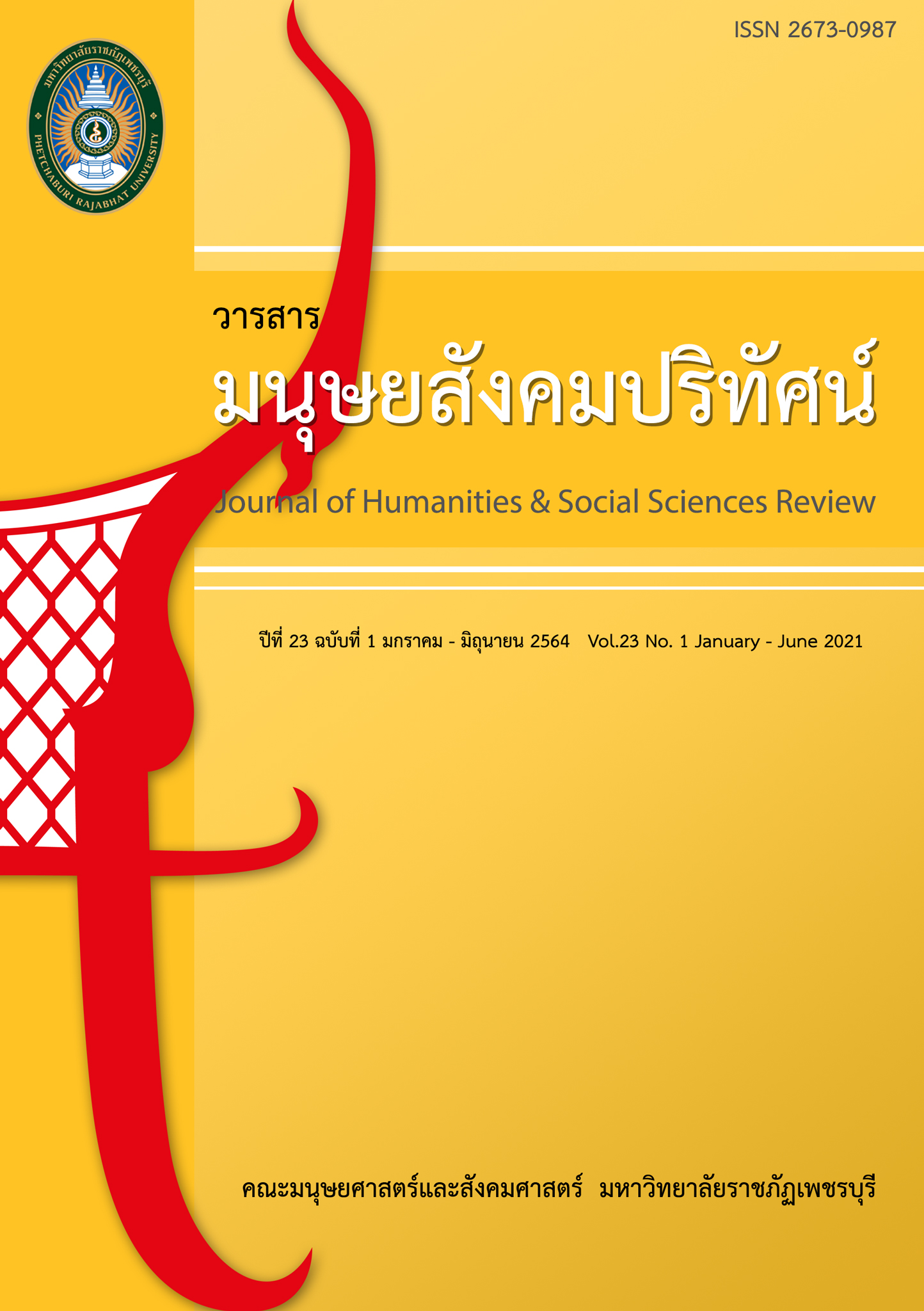กลยุทธ์การจัดการความเปลี่ยนแปลงของผู้ประกอบการร้านอาหารเจเนอเรชั่นใหม่
Main Article Content
บทคัดย่อ
การวิจัยครั้งนี้มีวัตถุประสงค์เพื่อศึกษา 1) การจัดการความเปลี่ยนแปลงร้านอาหารของผู้ประกอบการเจเนอเรชันใหม่ และ 2) คุณลักษณะของผู้ประกอบกอบการร้านอาหารเจเนอเรชั่นใหม่ ดำเนินการวิจัยโดยใช้ระเบียบวิจัยเชิงคุณภาพ เก็บรวบรวมข้อมูลด้วยวิธีการสัมภาษณ์เชิงลึก ประชากรผู้ให้ข้อมูลหลัก คือ ผู้ประกอบการร้านอาหาร ที่ดำเนินกิจการมามากกว่า 10 ปีขึ้นไป ในเขตกรุงเทพมหานคร วิเคราะห์ข้อมูลด้วยการพรรณาความ เครื่องมือที่ใช้ในการเก็บรวบรวมข้อมูล เป็นแนวคำถามสำหรับการสัมภาษณ์แบบกึ่งโครงสร้าง ร่วมกับการสังเกตการณ์แบบไม่มีส่วนร่วม เป็นเครื่องมือหลักในการเก็บรวบรวมข้อมูล
ผลการวิจัยพบว่า 1) การจัดการความเปลี่ยนแปลงร้านอาหารของผู้ประกอบการเจเนอเรชั่นใหม่ การจัดการความเปลี่ยนแปลง ได้แก่ การจัดการความเปลี่ยนแปลงภายในธุรกิจในด้านโครงสร้าง ด้านกลยุทธ์ ด้านกระบวนการตัดสินใจ ด้านกระบวนการทำงานและด้านบุคลากร รวมถึงการจัดการความเปลี่ยนแปลงภายนอกธุรกิจในด้านภาวะเศรษฐกิจ ด้านคู่แข่งขัน ด้านเทคโนโลยี ด้านการเมืองและกฎหมาย และด้านสังคมและประชากร 2) คุณลักษณะของผู้ประกอบกอบการร้านอาหารเจเนอเรชั่นใหม่ โดยผู้ประกอบการธุรกิจร้านอาหารนั้นได้มีคุณสมบัติดังนี้ ความเป็นตัวของตัวเอง ความมีนวัตกรรม ความกล้าเสี่ยง ความก้าวร้าวในการแข่งขัน ความสม่ำเสมอและความใฝ่ในในความสำเร็จ ซึ่งจาการศึกษาผู้ประกอบการสามารถนำข้อมูลที่ได้จากการศึกษามาบริหารจัดการเพื่อพัฒนาธุรกิจร้านอาหารให้เกิดความยั่งยืนต่อไป
Article Details
1. มุมมองและความคิดเห็นใด ๆ ในบทความเป็นมุมมองของผู้เขียน คณะบรรณาธิการไม่จำเป็นต้องเห็นด้วยกับมุมมองเหล่านั้นและไม่ถือเป็นความรับผิดชอบของคณะบรรณาธิการ ในกรณีที่มีการฟ้องร้องเกี่ยวกับการละเมิดลิขสิทธิ์ ให้ถือเป็นความรับผิดชอบของผู้เขียน แต่เพียงผู้เดียว
2. ลิขสิทธิ์บทความที่เป็นของคณะมนุษยศาสตร์และสังคมศาสตร์ มหาวิทยาลัยราชภัฏเพชรบุรีมีลิขสิทธิ์ถูกต้องตามกฎหมาย การเผยแพร่จะต้องได้รับอนุญาตโดยตรงจากผู้เขียนและมหาวิทยาลัยราชภัฏเพชรบุรีเป็นลายลักษณ์อักษร
เอกสารอ้างอิง
2. ณัฐสุดา ฟุ้งเฟื่อง. (2559). ปัจจัยแวดล้อมที่ส่งผลต่อธุรกิจ. สืบค้นเมื่อ 15 ตุลาคม 2562, จาก https://sites.google.com/site/businessandentrepreneurship/system/app/pages/recentChanges?offset=0.
3. ดุจฤดี คงสุวรรณ์. (2543) การเปลี่ยนแปลงทางสังคม. สืบค้นเมื่อ 15 ตุลาคม 2562, จากhttps://www.baanjomyut.com/library_2/development_of_society/11.html.
4. นิติพันธุ์ สุขอรุณ. (2561). ปฏิรูปกฎหมายเพื่อ"สตรีทฟู้ด" ทางเท้ายุคใหม่ใช้ประโยชน์คุ้ม. สืบค้นเมื่อ 15 มกราคม 2563, จาก https://www.posttoday.com/politic/report/562172.
5. วลิต ยิ้มประเสริฐ. (2558). ธุรกิจอาหารกับการเปลี่ยนแปลงของโลก. สืบค้นเมื่อ 15 มกราคม 2563, จาก http://www.mktevent.com.
6. วันวิสาข์ โชคพรหมอนันต์ และวิโรจน์ เจษฎาลักษณ์. (2558). คุณลักษณะของผู้ประกอบการที่มีต่อความสำเร็จในการดำเนินธุรกิจ ของผู้ประกอบการร้านค้า ในตลาดน้ำดอนหวาย จังหวัดนครปฐม. Veridian E-Journal, Silapakorn University ฉบับภาษาไทย สาขามนุษยศาสตร์ สังคมศาสตร์ และศิลปะ, 8(2): 967-988.
7. วัลยา ก๋ำรามัญ และวิโรจน์ เจษฎาลักษณ์. (2560). กลยุทธ์การสร้างความได้เปรียบทางการแข่งขันของโครงการหนึ่งตำบลหนึ่งผลิตภัณฑ์ กรณีศึกษา: บ้านลูกประคบสมุนไพร อำเภอพระประแดง จังหวัดสมุทรปราการ. Veridian E-Journal, Silapakorn University ฉบับภาษาไทย สาขามนุษยศาสตร์ สังคมศาสตร์ และศิลปะ, 10(3): 2007-2026.
8. วิทวัส รุ่งเรืองผล. (2558). กลยุทธ์สร้างความแตกต่าง. สืบค้นเมื่อ 15 มกราคม 2563, จาก http:s://www.sbdc.co.th/ knowledge/article/81/%E0%B8%81%.
9. ศิริพร พงศ์ศรีโรจน์. (2540). องค์การและการจัดการ (พิมพ์ครั้งที่ 6). กรุงเทพฯ: มหาวิทยาลัยธุรกิจบัณฑิต.
10. สิรวิชญ์ วรมงคล. (2562). เศรษฐกิจไทยปี 2562 ธนาคารแห่งประเทศไทย. สืบค้นเมื่อ 15 มกราคม 2563, จาก https://www. bot.or.th/Thai/ResearchAndPublications/articles/Pages/Article_22Jan.
11. อนนท์ ตุลารักษ์. (2556). การติดต่อสื่อสารเพื่อการประสานงาน. กรุงเทพฯ: ศูนย์ฝึกอบรมและพัฒนาทรัพยากรบุคคล.
12. Smart SME. (2561). เอาชนะคู่แข่งขัน ด้วยการสร้างความแตกต่างให้สินค้าและบริการ. สืบค้นเมื่อ 15 มกราคม 2561, จาก https://www.smartsme.co.th/content/86776.


